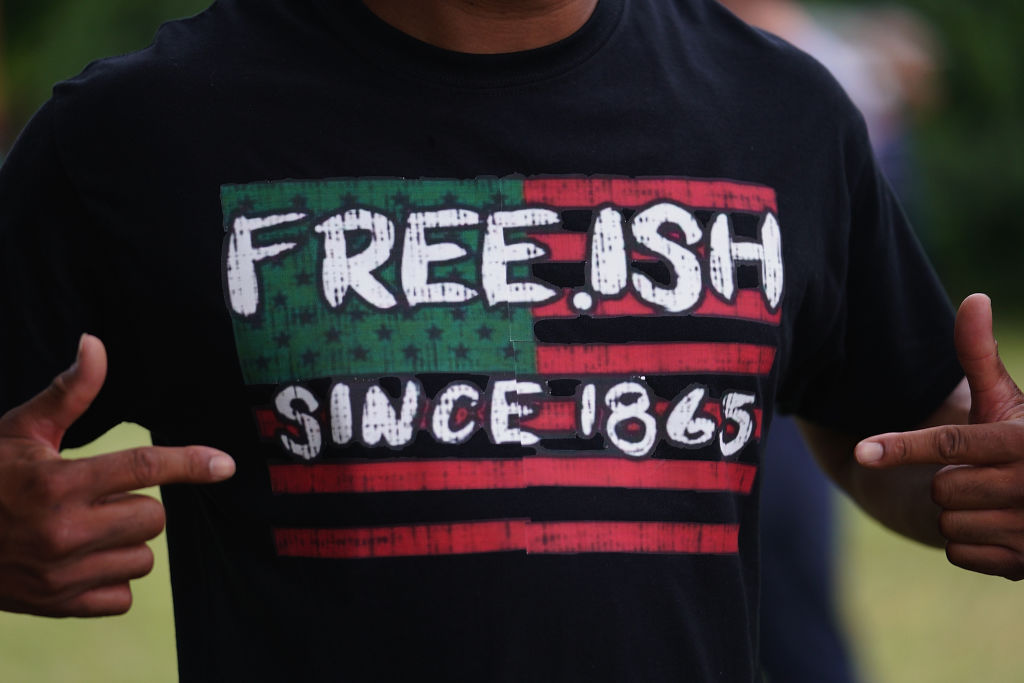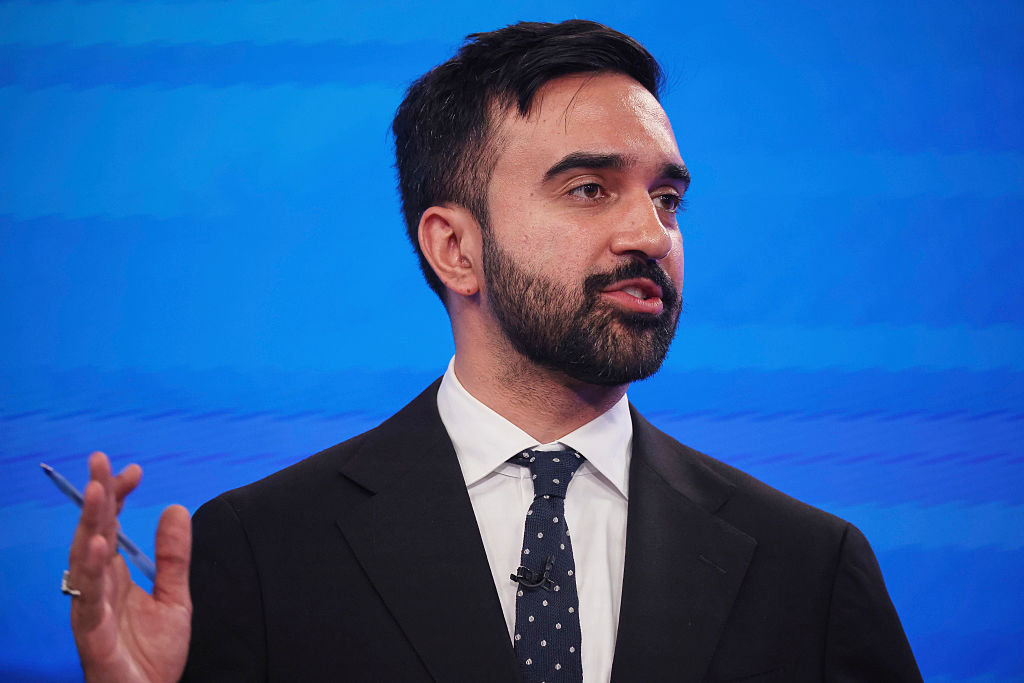The One Story: The Journey To Juneteenth
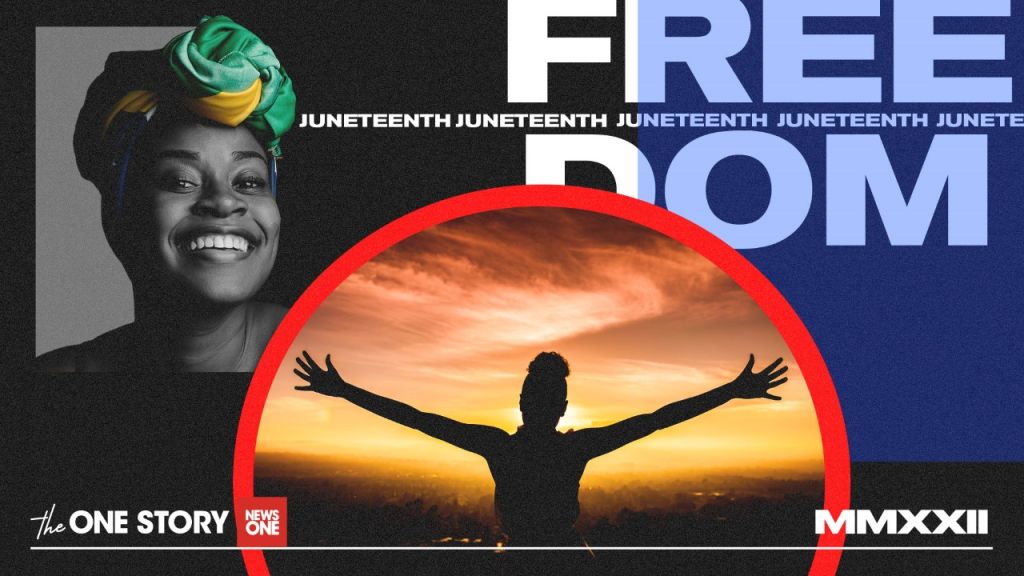
Source: iOne Creative Services / iOne Creative Services
The nation’s newest federal holiday is actually an observation that Black people have been celebrating for more than a century.
Juneteenth, which has also been referred to as Black Freedom Day or Emancipation Day, not only marks the abolition of slavery in the state of Texas on June 19, 1865, but is also a historic moment in American history and the culmination of President Abraham Lincoln’s Emancipation Proclamation that was written three years prior.
Texas was opposed to freeing slaves, prompting a military operation led by Union troops to cause the end of slavery in the Lone Star state.
The country, of course, didn’t always recognize Juneteenth. A poll last year confirmed that very few Americans know much if anything at all about Juneteenth. While it’s likely that number has grown since then, it’s even more probable that there are still far too many Americans who don’t fully grasp what it took to turn what were once localized celebrations into the official status of a national observation months later.
The cultural impact of Juneteenth is a resounding reminder of the country’s ugly past regarding the enslavement of Blacks. The roots of the holiday started in the coastal Texas city of Galveston, which served as the theater for the Union’s seizure and possession of the state and still remains the central area where Juneteenth celebrations have continued for decades. Similar celebrations subsequently began sprouting throughout the state – and across the country – where celebrants were using the day as an opportunity to reflect on the rich history and contribution of African Americans to the fabric of the country.
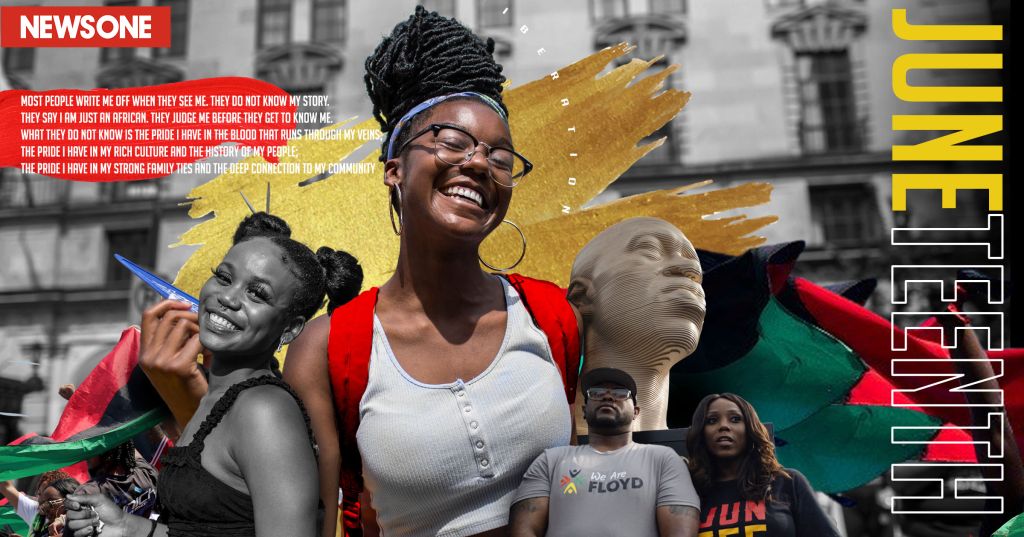
Source: iOne Digital Creative Services
Author Ralph Ellison would go on to pen much of his second novel, “Juneteenth,” around the events of the day. And while the book would be released posthumously five years after his death in 1999, a longer and more fleshed-out manuscript was released in 2010 as “Three Days Before the Shooting.”
Because of the oppressive specter of racism that still permeated much of American society, African Americans were barred from celebrating the holiday, especially around the start of the twentieth century. As the years of the Civil Rights Movement began to form, the celebrations would ramp up again across the nation. In 1994, civil rights and church leaders banded together at the Christian Unity Baptist Church in New Orleans to reignite interest in the Juneteenth movement.
Juneteenth-related organizations fought hard for recognition of the holiday, resulting in a 2011 decision by the District of Columbia and 40 states declaring the day a state holiday. With June also serving as African American Music Appreciation Month (also known as Black Music Month), Juneteenth organizers would stage several jazz- and music-related events incorporating the theme of emancipation at the root.
The “Modern Juneteenth Movement” successfully got legislation passed to have the day recognized as a nationally observed holiday on June 19, 2021.
How it started
Yes, Lincoln’s Emancipation Proclamation freed slaves on Jan. 1, 1863, but that didn’t mean they all knew that was the case.
“Once a law is passed, you then have to go through the long process of implementing that law, and during that period, anything can happen. Part of that is getting word to people that this is now what’s legal or not legal,” explains California Polytechnic State University history professor Thanayi Jackson, whose focus is the post-Civil War Reconstruction era. “So Juneteenth celebrates when people who were enslaved in Texas, which was the last place where this happened, learned that emancipation was the law and that slavery was now illegal. It’s not so much about the legal implementation of the law on paper, and you could argue that it took even after Juneteenth for enslaved people to truly be free, but Juneteenth celebrates the moment that law was actualized by enslaved people themselves.”
More than two years later, the enslaved people in Texas were officially “freed” on June 19, 1865, paving the way for slavery as a whole to be abolished on Dec. 6, 1865.
The following year, the first Juneteenth celebrations began in a tradition that would continue to blossom throughout the U.S. as the movement for it to be a federal holiday gained an increasing amount of momentum into the later part of the century.
It wouldn’t be until 1996 when Michigan Rep. Barbara-Rose Collins, a Black woman, introduced a joint resolution in the House “Recognizing the end of slavery in the United States, and the true day of independence for African-Americans,” as the legislation read in part.
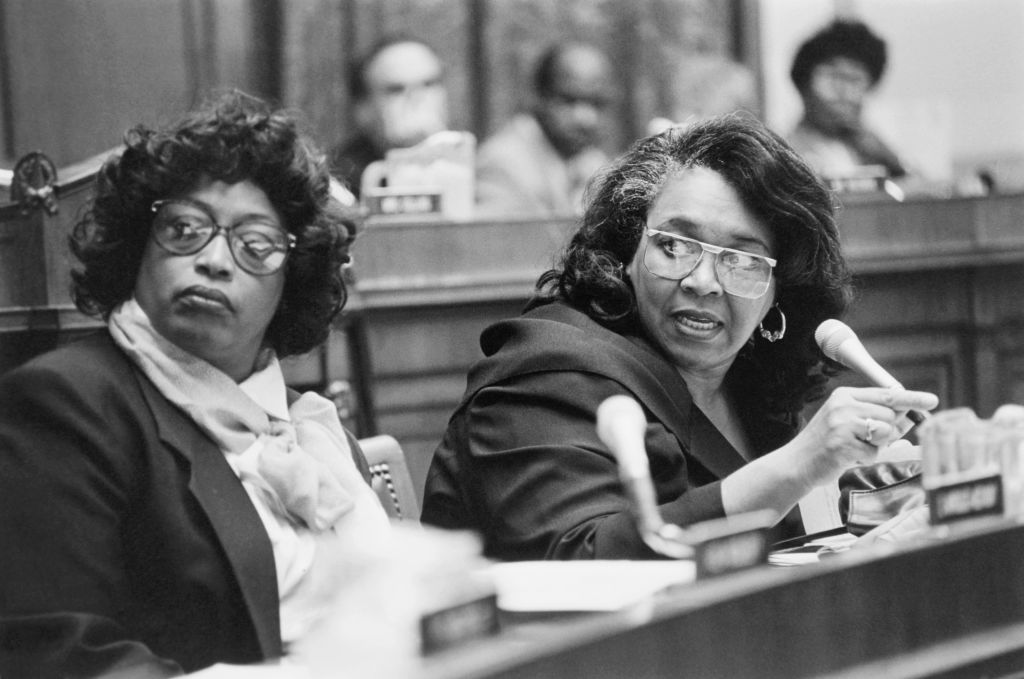
From left: Rep. Corrine Brown, D-Fla., and Rep. Barbara-Rose Collins, D-Mich., during government opposition markup session, just before Government Accountability Office hearings on October 28, 1993. | Source: CQ Archive / Getty
At that point, Juneteenth celebrations had been taking place across the country for more than 130 years.
That cleared the way for the 104th Congress to pass H.J. Res. 195 on Sept. 26, 1996.
The U.S. Senate passed its own similar legislation about 17 years later with Senate Resolution 175 to officially recognize “Juneteenth Independence Day, June 19, 1865, the day on which slavery finally came to an end in the United States.”
But as far as holidays go, Juneteenth was only being observed as such on a state level, albeit at an increasing rate. That served to be a catalyst for the movement for Juneteenth to become a federal holiday, which continued to flourish around the U.S.
One of the main motivations for making Juneteenth a federal holiday came from a woman named Opal Lee, who has often been called “the grandmother of Juneteenth” for the activist’s relentless devotion to the cause.
The Texas native worked for decades to make Juneteenth a federal holiday, beginning locally in Fort Worth before methodically working her way up to the national level. That includes raising awareness for Juneteenth by walking 2.5 miles each year to symbolize the 2.5 years it took for Texas to learn of the Emancipation Proclamation.
Lee is widely credited with securing Juneteenth’s status as a federal holiday thanks to the online petition she championed that was signed by more than 1.6 million people.
“I want Juneteenth to be recognized as a National Holiday,” Lee wrote last year on the Change.org petition. “Yes, Juneteenth originated in TX, but 47 states now have it as a state day of observance to commemorate the ending of slavery and more are making it a paid day off including Virginia, New York, and Texas. I believe Juneteenth can be a unifier because it recognizes that slaves didn’t free themselves and that they had help, from Quakers along the Underground Railroad, abolitionists both black and white like Frederick Douglass and William Lloyd Garrison, soldiers and many others who gave their lives for the freedom of the enslaved.”
The petition came about one year after the infamous Minneapolis police murder of George Floyd, which sparked nationwide protests that helped raise awareness of the myriad ways Black people have been mistreated in America for centuries. That, in part, prompted lawmakers to revive calls for Juneteenth to be a federal holiday.
Lee, who was 94 years old at the time, made sure to reference how much Floyd’s killing factored into those calls.
“It is not lost on me that the summer of 2020 saw the largest support of Juneteenth to be a national holiday because of the death of George Floyd highlighted the systemic racism that still exists because of the residual effects of slavery,” Lee added.
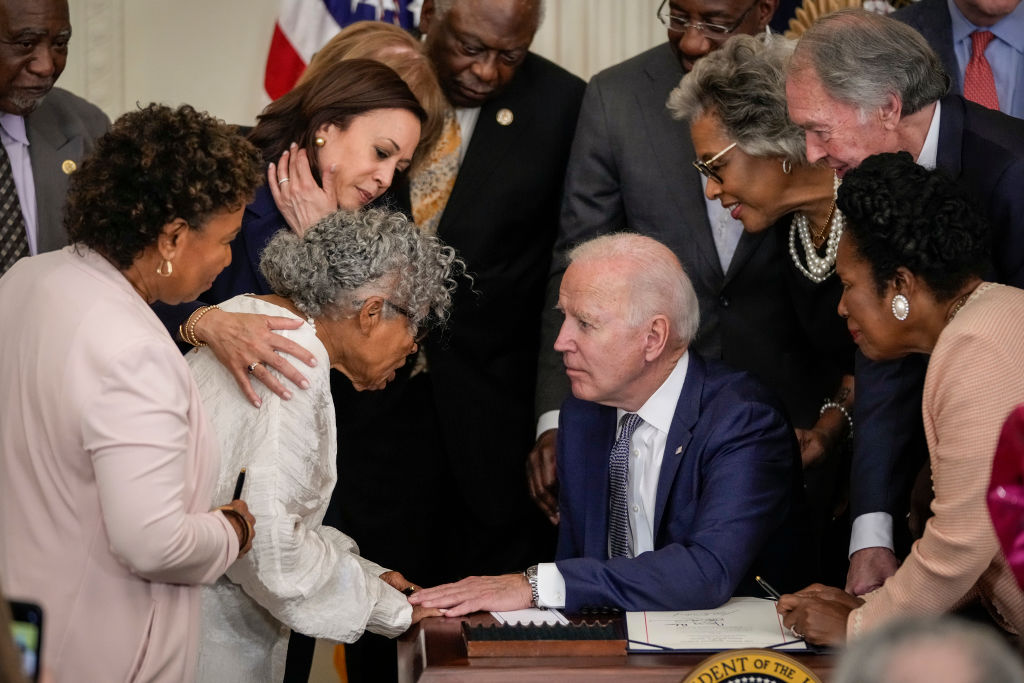
Activist and retired educator Opal Lee, known as the Grandmother of Juneteenth, speaks with President Joe Biden after he signed the Juneteenth National Independence Day Act into law in the East Room of the White House on June 17, 2021, in Washington, D.C. | Source: Drew Angerer / Getty
It would take just about one year later before the Senate passed the Juneteenth National Independence Day Act on June 15, 2021. Two days later, President Joe Biden signed the legislation into law to make Juneteenth the nation’s 11th federal holiday. Lee was standing beside Biden as he pressed his presidential pen into the paper to seal the deal.
On June 19, 2021, the U.S. observed its first-ever nationally recognized Juneteenth holiday.
How it’s going
The immediate response to Juneteenth becoming a federal holiday was seemingly split between those who were fully in favor of it and others who expressed fear that it could become culturally appropriated.
Leslie Mac, communications director for the Frontline, was among those who looked to history as being a primary indicator for the future of Juneteenth.
“While it has been wonderful seeing more Black people discover Juneteenth and learn about the legacy of this uniquely Black American holiday, it has been painful to watch the performative commodification of this day take root,” Mac wrote in an op-ed for NewsOne last year ahead of the Senate’s vote. “We are dangerously close to stripping all meaning out of this day and allowing corporate interests, political performance and capitalism to stake claim to this day.”
As it turns out, Mac was at least partially correct, as this year saw major companies like Walmart make a mockery out of Juneteenth by producing a flavor of ice cream under the same name.
The swirled red velvet and cheesecake ice cream was reportedly slated to come packaged in a yellow, green, and red container reminiscent of the Pan-African flag. The oddly designed product also featured two Black hands high-fiving each other.
“Share and celebrate African-American culture, emancipation and enduring hope,” the label on the ice cream read.
The backlash was swift, prompting Walmart to pull the ice cream product from the shelves of its freezers. However, the corporation decided to leave a number of its other Juneteenth products for sale, including party supplies, plates and T-shirts.

Walmart in Decatur, Georgia, pictured in May 2022. | Source: NewsOne
Mac questioned the sincerity behind the timing of Juneteenth becoming a federal holiday.
“My critique is not meant to diminish Ms. Lee’s work nor to stifle what is surely a joyous development for her personally,” Mac continued. “However, we must as organizers question the HOW and WHEN of this action. Why NOW? Why is the Senate so eager to pass a Federal Holiday marking the callous way that enslaved people were notified about the Emancipation Proclamation? What is THEIR goal?”
Cultural critic Trevor Baldwin similarly expressed skepticism and even wondered if a boycott should be in order because, as he wrote in an op-ed for NewsOne, “it feels like we’re honoring a crime – a day commemorating the end of a 2 ½ year hostage negotiation where the captors were not punished yet instead compensated for the inconvenience of slavery ending.”
On the opposite end of the spectrum, Ashley McIver, the senior community philanthropy officer for Communities Foundation of Texas, says Juneteenth is an opportunity to revise the hateful narratives about Black people in America, including and especially Black men. It is an opportunity to tell “the truth” about U.S. history, McIver said while pointing to the deadly insurrection at the U.S. Capitol as another reason for why Juneteenth is needed as a federal holiday.
“During the month that offers the clashing of public hearings on the Capitol insurrection as well as celebrations of Juneteenth and Father’s Day, it is crucial to subscribe to asset-based framing initiated by Trabian Shorters, CEO and co-founder of BMe, that supports an accurate story of Black people, especially Black men. It is one that defines them by their aspirations and contributions,” McIver wrote in an op-ed for NewsOne. “It is past time to tell a different story.”
The range of reactions expressed around Juneteenth becoming a federal holiday speaks to the myriad experiences of Black people in America. It also reinforces what Black people have been saying for many many decades now: There is no singular, monolithic so-called Black experience.
As such, Darlene Alfred, a United Women in Faith Board Member from the Central Texas Conference, invited all Americans to use the newest federal holiday as “an invitation to continue learning about our history while celebrating the possibilities of tomorrow.”
“As I reflect on Juneteenth, two old sayings come to mind: “I don’t know what I don’t know” and “You can’t teach what you don’t know,” Alfred wrote for NewsOne. “These simple phrases speak volumes. Our job as a community is to support the education of our youth, ensuring they are aware of our past and present as well as our hope for the future.”
SEE ALSO:
OP-ED: What Juneteenth Means to Me
OP-ED: Juneteenth, Father’s Day And The Black Male Narrative: Why The Truth About Jan. 6 Matters
